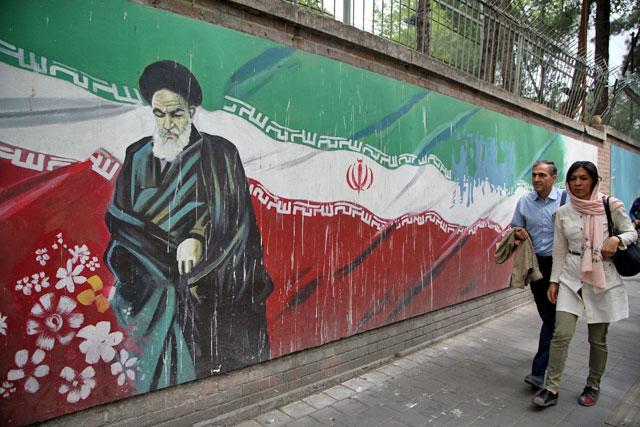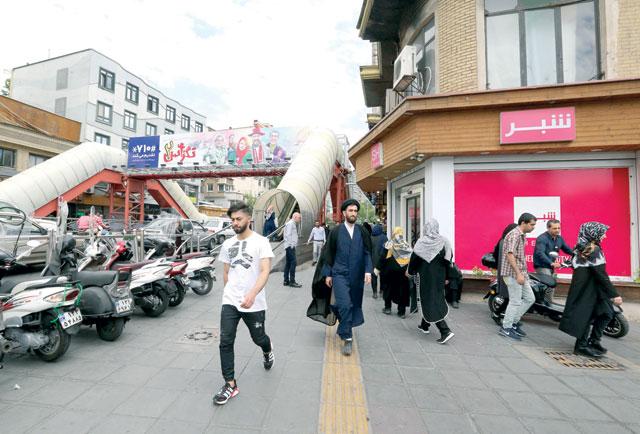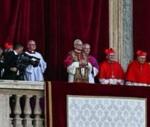You are here
US diplomats face tough task imposing new Iran oil curbs
By Reuters - May 10,2018 - Last updated at May 10,2018

People past a mural painted on the wall of the former US Embassy in Tehran, Iran, on Wednesday (Anadolu Agency photo)
WASHINGTON — By restoring sanctions against Iran, US President Donald Trump has tasked a little-known State Department office with convincing companies and governments worldwide to cut imports of Iranian crude — even if that means paying more to buy oil from other suppliers.
The Bureau of Energy Resources got the job done during the Iran sanctions that spanned 2012 to 2015, when president Barack Obama had the cooperation of European leaders in choking off Iran's main revenue source to pressure it to curb its nuclear program.
This time around, the office faces steeper challenges: Europe's leaders now oppose Trump's aggressive stance on Iran and are considering ways to block the sanctions; the US Senate has yet to confirm a leader for the bureau; and the State Department already has its hands full managing sanctions on Venezuela, trade disputes with China, and looming talks with North Korea.
"It's going to be a lot harder this time," said Amos Hochstein, who led the bureau under President Obama, when diplomats from the United States, Iran, China, France, Russia, the United Kingdom and Germany formed the 2015 nuclear deal. "There's going to be a lot less good will."
Under Trump's renewed sanctions, foreign firms will have 180 days to make reductions or face penalties that can include fines and restrictions on doing business in the United States.
Washington can identify the buyers, sellers, traders, shippers, insurers and financial institutions involved in Iranian oil purchases because all foreign transactions in US dollars are cleared by the Federal Reserve. The work is harder if trades are done in other currencies.
The United States has banned Iranian oil imports to its own shores for decades, so Washington's ability to squeeze the exports will rely on convincing foreign governments and companies to pressure the Islamic Republic back to the negotiating table for a "better deal" — as Trump has said he expects.
Officials at the Department of Treasury, the Department of Commerce and the White House did not respond to a request for comment on the difficulty in managing oil curbs on Iran. When asked about the challenges, energy bureau spokesman Vincent Campos said the office "will carry out sanctions policy in the current environment."
If successful, sanctions would slash exports from one of the top suppliers in the Organization of the Petroleum Exporting Countries (OPEC) and likely raise prices for crude globally by forcing buyers to compete for alternative supplies. US oil prices have already vaulted over $70 a barrel to highs not seen since 2014.
European resistance
Under Obama and Hochstein, Iran's exports of oil plummeted from about 2.5 million barrels per day (bpd) to less than 1.3 million bpd, according to the US Energy Information Administration.
Imposing those cuts was difficult, even with more geopolitical backing. Teams from the bureau joined with colleagues from the Departments of Treasury and Commerce to visit governments in Asia and the Middle East, cajoling them into finding alternatives to Iranian oil, and to help battle smuggling.
The European Union joined the United States and passed its own Iran sanctions in 2012, cutting its imports of Iranian oil from 650,000 bpd to zero.
This time, European leaders will be less helpful. They have urged Trump not to leave the nuclear deal, which they say was hard-won and has proven to be an effective tool preventing Iran from obtaining a nuclear weapon. The European Union, meanwhile, is considering a so-called "blocking statute" that would ban any EU company from complying with the US sanctions.
French President Emmanuel Macron warned before Trump's announcement that if Washington pulls fully out of the deal, it could start a war. The leaders of Germany, England, and Russia have also expressed dismay — and are scrambling to salvage the accord after Washington's exit.
A State Department official told reporters in a briefing Tuesday that no US diplomats had yet engaged with any private sector energy companies about cutting their Iranian purchases but that energy bureau staff would "move out immediately" to do so.
Sources with three global trading houses involved in Iranian oil purchases said they expected Iran's customers to ask for waivers under the US sanctions.
Some Asian governments, including South Korea, India and China, are also hoping they can avoid the brunt of the sanctions by acquiring waivers — which the US government has said it will only consider granting if a country shows a good faith effort to cut Iranian purchases.
Grunt work
The job facing the bureau on Iran sanctions will require strong leadership and a robust workforce, according to three former State Department officials who worked on sanctions.
But the State Department's energy bureau is embarking on this difficult work without a permanent leader and with some vacancies in the mid-level ranks from a hiring freeze and transfers.
Trump's nominee to head the bureau, Francis Fannon — a former head of corporate affairs at BHP Billiton and senior director of Murphy Oil Corp — awaits Senate confirmation.
The bureau is currently being managed by a special envoy, John Marrick, a former corporate lawyer and energy advisor for Republican John McCain's unsuccessful 2008 presidential campaign.
A State Department inspector general report said in 2016 that 81 people worked full time at the bureau. Campos declined to say how many worked there now, but said the teams managing sanctions on Iran and Venezuela are fully staffed.
Bob McNally, former President George W. Bush's top energy adviser, said the State Department is "fully able" to make the sanctions work but the administration still needs to define its goals.
The sanctions imposed under the Obama administration were threatened by smuggling of Iranian oil, by crews shutting off tracking devices on tankers, mixing Iranian oil into tankers of non-Iranian oil and other methods. Energy bureau officials controlled that problem through close coordination with other US agencies, embassies abroad and local law enforcement, the former State Department officials said.
The bureau also needs to determine how much it wants companies to reduce Iranian oil imports, which requires deft diplomacy and an analysis of historical buying trends. The previous administration avoided telling countries percentages it wanted them to cut and allowed some countries to buy more than others, but countries ended up cutting purchases about 18 to 20 per cent.
"There is a lot more that goes on in the everyday grunt work than, bluntly, I think this administration understands," Richard Nephew, who served as the lead sanctions expert for the team that negotiated the Obama administration's 2015 deal with Iran, said in an interview.
Another key priority will be to set a clear requirement for the lifting of sanctions. In 2012, the sanctions were designed to end once Iran agreed to specific limits on its nuclear program. This time there's less clarity, Hochstein said.
"Countries never want to be told what to do with their economy," said Hochstein. "At least before it was toward a specific end. Now it's open ended."
Trump said on Wednesday that Iran would now either negotiate to alter the 2015 deal, or "something will happen".
Related Articles
BEIRUT — Iran announced the launch of a new missile production line on Saturday, according to state media, against a backdrop of tension bet
BERLIN — European countries said on Thursday they wanted to preserve Iran's nuclear deal and rejected "ultimatums" from Tehran, after Iran s
WASHINGTON — Turkey's top refiner, Tupras, is in talks with US officials to obtain a waiver allowing it to keep buying Iranian oil after Was















